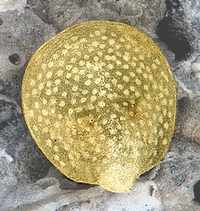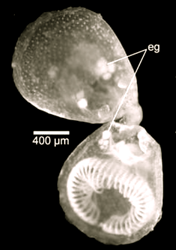 |
|
|||
|
Genus Gwynia King, 1859 |
[Type species = Terebratula capsula Jeffreys, 1859, p. 43] |
Biconvex, notothyrium triangular, wider and larger than delthyrium. Ventral interarea narrow, triangular, apsacline; delthyrium bounded by 2 small, oval teeth. Dorsal valve interior with a pair of well-developed, arcuate, submarginal ridges extending from stout inner socket ridges; dorsal interarea anacline; cardinal process not differentiated. |
Pleistocene - Present Diagnosis from volume 6 of the Treatise on Invertebrate Paleontology (2007) |
Extant Species of Gwynia |
|
|
Diagnosis Diagnosis |
|
|
|
Gwynia capsula (Jeffreys,1859) Type locality: Gwynia was described by King (1859) from a specimen collected by Jeffreys at Etretat (Normandy, France), while G. capsula was described by Jeffreys (1859) from a collection recorded in Belfast Lough, name of Belfast Bay (Ireland). Gwynia capsula (Jeffreys,1859), p. 43 No Diagnosis - |
 |
|
Gwynia macrodentata Lüter, 2008 Type locality: Moore Seamount, Station 13: depth 1605-1865 m, 40°25.202'S, 179°26.816'W
Very small brachiopod, about 1.5 mm shell length, slightly larger than Gwynia capsula. Trocholophous lophophore with highly spiculated connective tissue. Ventral valve with massive, two- lobed teeth and broad, rather flat median septum. Shell semi-transparent, light brown, densely punctate. Short but sturdy pedicle, with both valves forming the pedicle opening. |
 |
